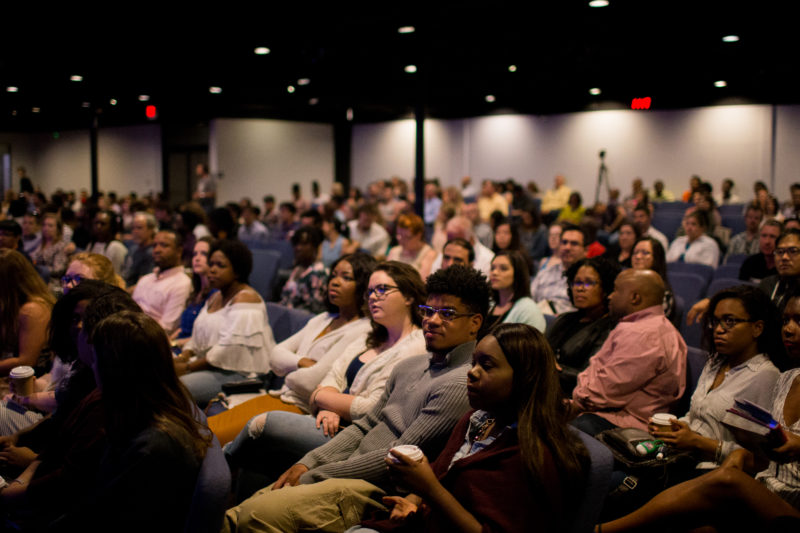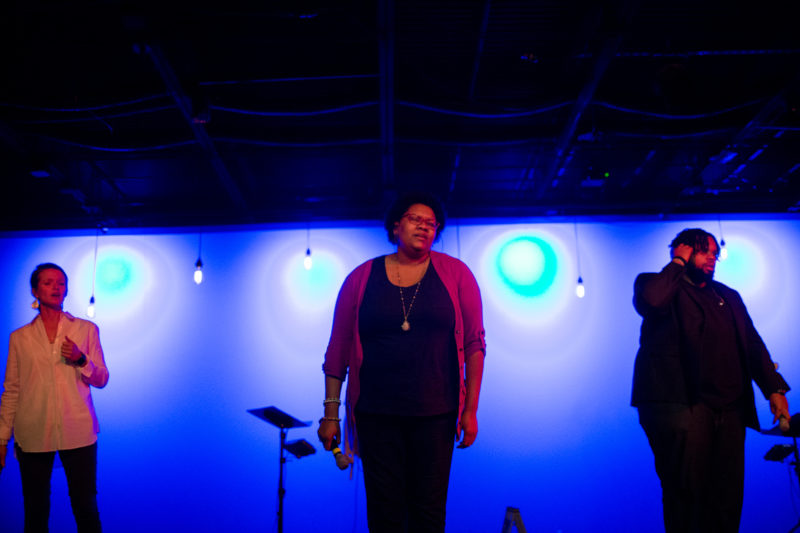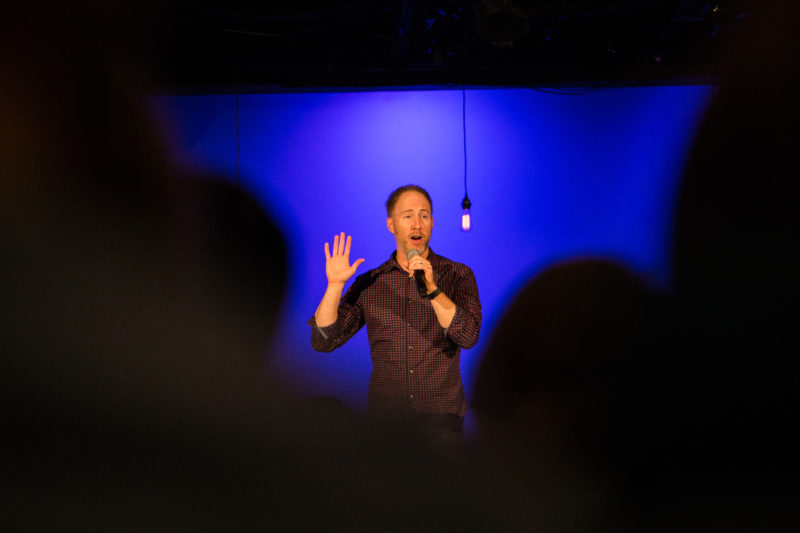Church Finds New Path to Growth With a Mission of Diversity
By Taylor Jackson Buchanan
Photography By Christian Benavides
Reporting Texas

Mosaic Church serves a diverse congregation of about 1,000 members. Christian Benavides/Reporting Texas
Perched on a metal stool, Morgan Stephens tugs at his blazer and adjusts his notes. “The last words of Jesus were a call – a commission – to go build a multi-ethnic church,” he says. “One full of all peoples, all languages, all customs, all cultures.”
“A church full of people who don’t look the same, who don’t talk the same, who haven’t been educated the same,” Stephens tells his congregation, as he sits beneath the stage lights at Mosaic Church in North Austin. “From the beginning, God has had a multi-ethnic church in mind.”
The hundreds of faces before him comprise a rich palette of diversity.
Stephens, who is white, leads a multiracial, multi-generational Christian congregation. The church is true to its name, with a membership that spans different races, languages, political views, incomes and ages.
It is not the norm: In 85 percent of Christian churches, 90 percent of the congregations are of a single race, according to The National Survey of Congregations, a representative sample of America’s churches, synagogues, mosques and other places of worship. The 2007 survey of 3,800 U.S. churches is the most recent study with such detail.
The findings illuminate what Dr. Martin Luther King Jr. said more than 50 years ago. “We must face the fact that in America, the church is still the most segregated major institution,” King said. “At 11:00 on Sunday morning, when we stand and sing that Christ has no east or west, we stand at the most segregated hour in this nation.”
Contemporary religious scholars say churches must become more diverse. Failing to do so could mean “the decline of the U.S. church as we know it,” according to Michael Emerson, a professor of sociology at Rice University.
The history of Mosaic Church illuminates the danger. The congregation nearly shuttered its doors seven years ago. In 2010, Stephens, now 41, became lead pastor of what was then Christ Community Church. The church had a dwindling 200-member congregation and its finances were in dire straits.
“Churches will usually close and not make it for less than what happened here,” Stephens said. The church was facing potential foreclosure on its building but found someone to lease an extra building across the parking lot.
Stephens and the leadership team broadened their mission, focus and congregation. In 2015, they adopted the name Mosaic Church to reflect a diversifying congregation and draw new members committed to the same goal. Now more than 1,000 people walk through the doors any given Sunday.
“A multiracial atmosphere provides the context where Christianity can flourish the most,” Stephens said. “Where we have the least in common, we have to fight for common ground the hardest. So a multiracial church environment actually asks us to love in many ways more than a homogeneous environment.”
Stephanie Khoury has attended Mosaic for 13 years. The church has changed names, buildings, worship leaders and pastors since she first walked in the doors. She said one of the most noticeable changes is the diversity of parishioners and staff.
“I’ve always been different than the people around me,” said Khoury, whose heritage is Middle Eastern. “But I don’t feel as different when I’m at Mosaic. I’m valued, even celebrated.”
Truly empowered, racially diverse leaders are essential for the health of a multiracial organization, according to Emerson at Rice. Without this involvement, “people are largely tokens,” he said. Diverse leaders relate to various parishioners and their experiences.
“On every level of leadership, we involve people from different backgrounds,” said Carrie Stephens, Morgan’s wife of 16 years. From youth pastors to band leaders, elders to deacons, congregants say they see and feel that their church leaders are diverse.

Marie Victor, center, performs during a recent service at Mosaic Church. Christian Benavides/Reporting Texas
Mosaic also is trying other things: Playing a mix of worship music – gospel, rock and hymns – with lyrics in English and Spanish, and organizing conversations about race and politics.
“We are tackling an area, and sometimes topics of conversation, that the church as a whole doesn’t really want to have, especially in regards to race and politics,” said Wendell Williams, Mosaic’s youth minister, who is African-American. “We have created space and avenues to have those difficult conversations with church members and other people who live in Austin.”
Mosaic holds quarterly conversations about diversity. The first, called the Gospel and Race, was in 2015, and a Gospel and Politics forum was held throughout the contentious 2016 election season. “We are learning to love each other through divisive and traumatic nationwide events that speak to the very core of racial divides,” Stephens said. Participants learn to communicate honestly, listen reflectively and respond empathetically to current events, from police shootings to immigration.
“With the way the world is right now, we have to be able to talk about things like race and politics in a safe place,” Khoury said. “Immersing yourself in a diverse culture like Mosaic is a wonderful start. What better way to represent the gospel than be in community with people from every tribe and nation?”
During the week, groups of 10 to 15 people meet in homes, coffee shops, restaurants and parks to build relationships and “live life together,” according to Williams. About 70 percent of Mosaic members participate in the gatherings in addition to attending a Sunday service.
Stephens reflects on his own background as he prepares his sermons, counseling sessions and interactions.
He grew up in Irving, the son of an educator and a salesman-entrepreneur. The family attended services at a Methodist church that was “99.9 percent white.”
He excelled in school and attended the University of Houston on a full scholarship. He played collegiate baseball and dreamed of playing professionally. In 1995, when a teammate invited him to a multi-ethnic Christian student group, he found his calling.
“I became a Christian in the middle of a multi-ethnic, multiracial environment. And that 100 percent shaped my view of church,” Stephens said. “I was forced to have close-knit, loving relationships with people who were absolutely different than I was.”
Now Stephens reads multiracial literature, reflects on his own “white privilege,” researches cultural norms and seeks input from the diverse members of his church.
Stephens has thought about where the nation is headed, and about how to turn his corner of Christianity into a world that is as inclusive as possible.
“It’s not enough to not hate someone,” Stephens said. “Christianity goes beyond just tolerance into grace and love. That’s the DNA of Christianity. Unfortunately, it’s not expressed as often as it should be.”
Mosaic works to be racially inclusive. By empowering leaders and members to participate in a multiracial vision, inviting guests of all backgrounds, the church has continued to diversify.
“My friends who are married to someone of a different race have to constantly navigate where the other person is coming from,” Carrie Stephens said. “When they come to a church where they both feel honored and loved – and they don’t feel like they are picking a white church or a black church or an Asian church – they stay.”
Jay and Lynnea Huckabee have attended Mosaic for a year and a half. “The first time we went, it felt like home,” said Lynnea. She is Hispanic and white; her husband is white. After visiting several other Austin-area churches, the Huckabees said they chose Mosaic because they want to raise their two children “around a diverse group of people.”
Church leaders emphasize the importance of creating space for people from different backgrounds to have ongoing relationships.
“The model in the past has been separate black, white and brown churches,” Stephens said. “We go to that church, visit, shake hands, have a meal, go home, but we still don’t really know each other… We don’t raise our kids together, we don’t play on the same sports teams.”
His congregation is a window into how a small but growing number of modern churches deal with racial divides in a polarized society.
“Involvement in multiracial congregations, over time, leads to fundamental differences,” Emerson said. “Friendship patterns change.” National surveys show that people in multiracial congregations have more friendships across races than do other Americans.
Emerson adds: “The implication for a racially divided but changing nation is clear. In contemporary times, multiracial congregations offer a promising path forward.”
This story has been updated to correct the year the church changed its name and the details of how it avoided foreclosure.

Morgan Stephens, lead pastor of Mosaic Church, shares Bible verses with his congregation at a recent Sunday service. Christian Benavides/Reporting Texas